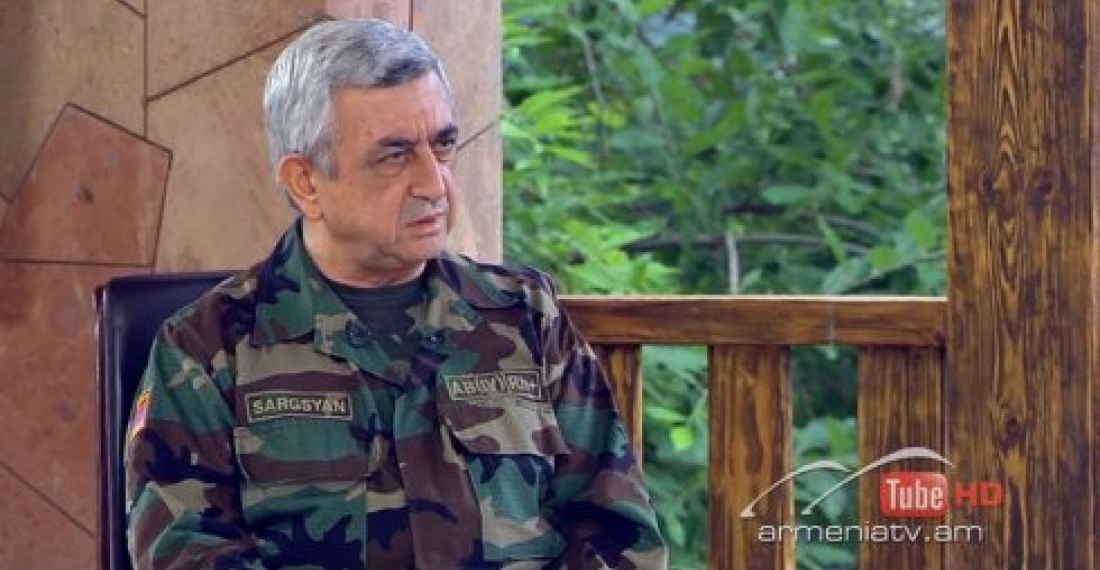The Iskander ballistic missiles that Armenia has recently acquired from Russia are not simply important for moral or for psychological purposes. The system has a devastiting force, and Armenia will use it if necessary. This was stated by Armenian president Serzh Sargsyan in an interview with Armenia TV. In the interview, the Armenian president, wearing military fatigues, discussed the state of the Armenian armed forces, the current state of the Karabakh peace process, and relations with Russia
The official Armenpress News Agency reported that asked to say in what circumstances Armenia will launch the Iskander missiles the President answered “If needed. Don’t forget that our interview is watched not only by citizens of Armenia. You are forcing me to answer to a question, for the response of which numerous special services are spending huge resources. And whoever thinks that Iskander [ballistic missiles] is just of moral and physiological significance, he doesn’t understand what Iskander is. When they know, they will understand what devastating force this weapon has".
The president also talked about his recent visit to military positions and said that the country has excellent officers and soldiers, who are highly professional. “Can anyone say that our army hasn’t developed? Can they say that our current officers aren’t significantly different in their level of literacy from the officers who served twenty years ago, in terms of both quantity and quality? I am coming from the combat positions, we have excellent officers, soldiers, who know their job”, he said.
President Sargsyan added, “We are few in numbers, if we want Nagorno Karabakh and Armenia to be secure and safe, any Armenian, regardless of gender must become a soldier in case of necessity. When this moment comes, the nation becomes an army. During peacetime the army also participates in developing the country. This is a very simple logic. We want to achieve maximum in this branch. We don’t want insignificant incidents to cast a shadow on our military”, he said.
The Armenian President also spoke on the Karabakh peace process and said that a meeting between the presidents of Armenia and Azerbaijan may take place in the autumn. Serzh Sargsyan said that preliminary agreement was reached with the co-Chair of the Minsk process some weeks ago, adding that the Armenian side has informed the mediators of its position, "we do not have particular expectations, but we are not opposing the idea".
President Sargsyan said that "Meetings at the level of presidents should be seriously prepared - there must be a position on concrete proposals. This work is not being currently conducted. Nevertheless, we are not against such a meeting. The meeting can take place in autumn," the president added.
In the interview, President Sargsyan also spoke on Armenia-Russia relations, emphasising that the sale of Russian arms to Azerbaijan was the most painful aspect of this relationship.
"This is the most painful aspect of the Armenian-Russian friendship, the Armenian-Russian military cooperation, and our relations, in general. This issue casts a shadow on a lot of things. However, on the other hand, there are circumstances and, perhaps these circumstances are acceptable for them, but not for us. Nothing serious has happened so far. If once there are serious consequences, then it will be possible to blame them. And if there are no serious consequences, we should take this as a long-term political activity of the Russian side for stabilization of the situation in the region," the Armenian leader stressed.
Commenting on some politicans'opinions concerning the need to review military cooperation with Russia, Sargsyan said: "These are extremely dangerous words that can create an extremely bad situation. With whom do you want to revise and improve - with Turkey or with NATO? One might think that everyone with open arms waits that Armenia will come to them."
source: commonspace.eu with reports from armenpress.am, news.am and other Armenian media outlets
photo: President Serzh Sargsyan wearing military fatigues, being interviewed by Armenia TV on 16 July 2017 (picture courtesy of Armenia TV)






